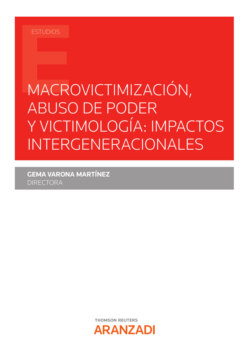Читать книгу Macrovictimización, abuso de poder y victimología: impactos intergeneracionales - Gema Varona Martínez - Страница 13
На сайте Литреса книга снята с продажи.
1.2. Support and assistance to victims of terrorism
ОглавлениеFollowing various requests37 from the European Ministers of Justice, the Council of Europe has adopted several measures to improve assistance to victims of terrorism at national level. For instance, the Recommendation 1677 (2004) of Parliamentary Assembly on Challenge of terrorism in Council of Europe Member States of 6 October 2004 calls on Member States to adopt an integrated approach and a legislative framework to ensure the protection, rehabilitation and compensation of victims of terrorism.
More significantly, the Guidelines on the protection of victims of terrorist acts (adopted in 200538 and revised in 201739) provide detailed guidelines on measures that Member States should take to provide adequate support and assistance to victims of terrorism and their families. Overall, the Guidelines largely reflect the general standards for assistance to crime victims, such as: medical, social, material and psychological assistance; information to victims and their relatives (concerning their rights, possibilities of obtaining assistance, etc.); protection of the dignity, security and privacy of the victims; protection against intrusive media practices; specific training of those responsible for assisting victims.
A series of guidelines are also intended to promote victims’ rights in the criminal proceeding, such as: effective access to justice; right to review decisions not to prosecute; witness protection; right to participate in the criminal proceedings; right to bring a civil action to obtain reparation or protection; information on the follow-up of the investigation and prosecution; legal aid and interpretation services; etc.
As regards the transnational nature of current terrorist victimization, the Guidelines provide that “If the victim does not normally reside on the territory of the State where the terrorist act occurred, that State should co-operate with the State of residence in ensuring that the victim receives such assistance”40.
It should also be noted that the Proceedings of the High-Level Seminar on “Protecting human rights while fighting terrorism” of 200541 point out that these Guidelines are only a starting point for other initiatives, with the long-term goal of developing binding instruments in this area, such as a protocol to the 2005 Convention on the Prevention of Terrorism that would be dedicated to the assistance to victims of terrorism42. It should be stressed that this Convention already contains a provision on “protection, compensation and support for victims of terrorism” (article 13), asking Member States to adopt necessary measures to protect and support victims of terrorist acts committed on their territory43.
The Proceedings of the High-Level Seminar on “Protecting human rights while fighting terrorism” of 200544 also contain a series of measures that Member States should take to protect the rights of victims of terrorism (compensation, security, emergency and long-term assistance, protection of their dignity, of their privacy and family life, psychological support, effective access to justice and information, reintegration measures, etc.)45.
The Group of specialists on assistance to victims and prevention of victimisation of the Council of Europe (PC-S-AV), in collaboration with the Committee of Experts on Terrorism (CODEXTER), also elaborated a series of reports and recommendations to improve assistance to victims of terrorism46. For instance, the Group participated to the elaboration of the 2006 Recommendation of the Committee of Ministers on assistance to crime victims with the aim of guiding Member States in defining their legislation and practice on assistance to victims of terrorism47.
In this regard, the 2006 Recommendation of the Committee of Ministers on assistance to crime victims contains several provisions aimed at improving support for victims of terrorism48. For instance, article 9 of the recommendation encourages States “to promote the principle that insurance policies do not exclude damages caused by acts of terrorism unless other applicable provisions exist”. The recommendation also provides that specialized training should be provided to all personnel working with victims of specific categories of crime, such as terrorism (article 12.3). In this respect, the recommendation encourages the establishment of specialized centres for victims of crimes of mass victimization such as terrorism (article 5.4).
In its summary report of the 1st meeting of May 24, 200549, the PC-S-AV also addresses the issue of multiple victimization. In this regard, the Group raises the interest of using methods in group work or networking of victims of the same event50. The PC-S-AV also calls on Member States to enhance their capabilities to provide large-scale emergency assistance to deal with mass-victimization situations51. In its document entitled “Victims of Terrorism”52, the Group specifies that assistance measures should be offered to isolated victims as well as to groups of victims of terrorist attacks.
In order to improve crisis management and assistance to victims in case of terrorist attacks, the Council of Europe has also stressed the need to strengthen cooperation and coordination between Member States but also between the various local entities active in the field of victims assistance53.
